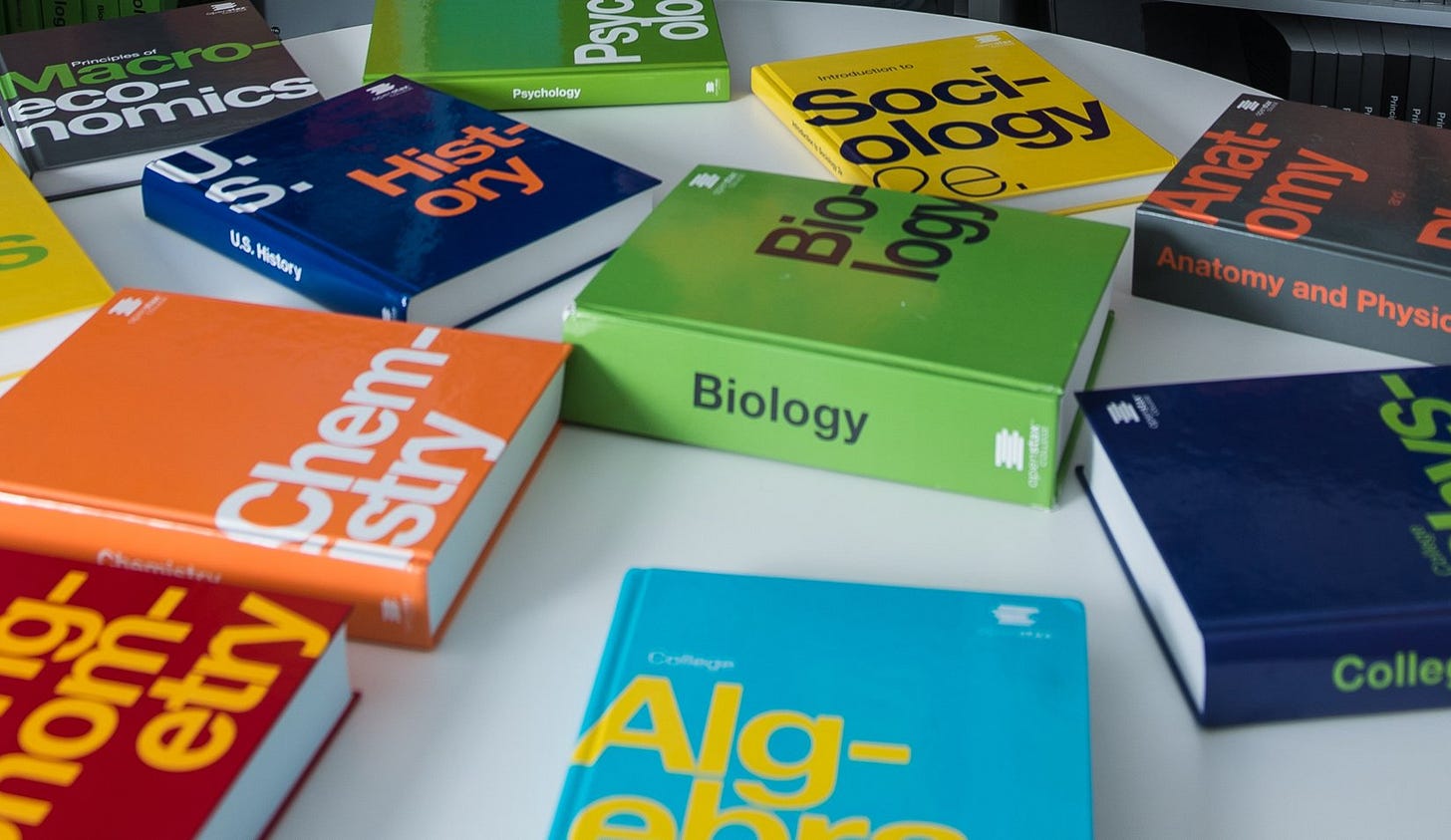Iterate Weekly - Issue 76
This week a text alert thwarts a blackout in California, Openstax makes textbooks free, On-demand microtransit is the future, JoeBlogs about sports, and Seinfeldia!
Welcome to issue 76 of Iterate Weekly!
Just a reminder that you can always reply to this email or leave a comment on the web version. I read all of them, and I appreciate the feedback, questions, and insights from all of you.
Let’s jump into this week’s stories.
🤖 Tech
Text Alert Thwarts Blackout
This one really could be considered both a tech story or an environment story.
It’s no secret that heat waves are becoming a regular part of the summer in many parts of the world. Even my omni-temperate corner of the Bay Area wasn’t immune to some triple digit readings recently.
Along with those record high temperatures came a real threat of pushing the power grid to its limit. For several days, their was a growing concern that the excessive electric load of fans, air-conditioning units, etc. would put California in a state of darkness.
But then something happened. Something decidedly low tech helped steer nearly 40 million people away from disaster. The state just sent a text alert telling everyone to cool it with their electricity usage.
And would you believe it actually worked?
Let’s break this down for a second. As modern humans, we’re pretty trained to listen to our phone when it gives out a been or buzz. But this alert was one of those loud, sustained, super emergency sounds. You may have come across an alert like this during a nearby child abduction (Amber Alert) or when a major weather event is coming through. It’s typically warning you to be aware of something. During this heatwave, California was telling you to do something instead. Turn things off!
The official terminology here is a Level 3 Emergency Alert, it’s the highest such alert that the state can issue. Once this came down at 5:17pm, the governor’s office issued their cell phone alert at 5:47pm. The exact wording was this:
“Conserve energy now to protect public health and safety. Extreme heat is straining the state energy grid. Power interruptions may occur unless you take action. Turn off or reduce nonessential power if health allows, now until 9pm”
I’ll admit that it worked on me. Most things were already turned off in an effort to keep the house cool, but I double checked any other source of unnecessary power. Evidently, I was not alone. Within 15 minutes of the alert, power usage had decreased over 1,200 megawatts.
I wanted to highlight this story as an amazing use of widespread civic technology that made a positive impact. While sending a text alert doesn’t sound like groundbreaking tech, it kind of is when it’s going out to 40 million recipients. It’s just good to know that people are receptive to this type of alert system. We know it’s only a matter of time until there is an earthquake, fire, or something else that will require Californians to come together as one around a common goal.
Any Californians out there want to share their experiences with this system? Are there other regions where this has worked well?
🎓 Education/Productivity
Openstax Makes Textbooks Free
If you went to college during a certain time period, you’ll remember the immense cost of textbooks and learning supplies.
While the rise of second-hand textbook marketplaces and digital resources has given students more cost-effective options, a company called Openstax wants to make textbooks free and open for all.
Openstax comes from the folks at Rice University and is a 501(c)(3) nonprofit charitable corporation. Their mission is pretty simple, they want to publish high-quality, peer-reviewed, openly licensed college textbooks that are absolutely free online and low cost in print.
It’s certainly a noble effort and they’ve made great strides since their first textbook was produced in 2012. While I do understand that educational content has monetary value (someone has to do a lot of work to research and edit these texts), it’s important to offer open-sourced versions that can be accessible for all economic backgrounds.
As I’m in favor of open-sourcing most aspects of life, I’m really pleased to see Openstax making a real difference in the higher-ed space.
Anyone else remember how expensive textbooks used to be?
♻️ Health & Environment
On-demand Transit is the Future
For generations, most cities relied on traditional public transportation systems. There were bus routes, train schedules, maybe designated cab pick-up areas. But modern transportation is changing, and municipalities are doing their best to adapt.
On-demand microtransit options are likely the way of the future.
Yes, I’m old enough to remember what it was like trying to book a taxi in San Francisco on a Saturday night before rideshare services like Uber and Lyft changed everything. In some neighborhoods you’d be stranded for hours. Calling the cab services was a futile exercise. Then we got smart phones and everything changed.
Some cities are re-thinking this problem on a smaller scale. You can think of this as a public version of a ride share system. If you’re looking to catch a train but aren’t within walking distance of the train station, you can request a ride via an app or by phone and have a vehicle pick you up right at your home or at a nearby destination for a small fare (often with other passengers riding along). Theses vehicles can take you to a transit hub or directly to your destination if it’s close enough.
It’s essentially the same way many people have been using Uber or Lyft for a while, but it gives municipalities more control over things like pricing and user data. Ridership trends could easily reshape bus routes and train stations in a way that wouldn’t happen with the walled garden of data hoarding often employed by ride share companies.
I think of it like the rise of many local food delivery services. Yes, there are big companies like Uber Eats, Grubhub, Seamless, (insert your service of choice). But there has also been a rise in local food delivery services that make sure that local restaurants get a majority of the revenue. This could allow smaller cities to keep some of that revenue that would otherwise end up in the hands of big ride share companies.
Cities like Austin, Texas; Wilson, North Carolina; and Valdosta, Georgia, have all gotten on board with some form of microtransit and I’m sure that list will only grow. I could see plenty of opportunities for this in other cities.
Would you use microtransit options like this?
🛍 Grab Bag
JoeBlogs About Football
Hey, it’s NFL football season for those of you who follow it! I’m not the most hardcore fan, but I do enjoy watching a game on a Sunday as a reminder of the changing fall season.
But even if you’re not a huge sports fan, I want to recommend you check out the fantastic writing found on Joe Posnanski’s Substack. It’s called JoeBlogs and you can check it out below.
Joe has been a sports writer for a long time and injects an amazing dose of personality and humor into every piece he writes. He takes on many writing projects including a list of the 101 best football players. His hit piece on his sports nemesis John Elway had me grinning from ear to ear.
Keep up the great writing Joe!
💬 Quote of the Week
“It's amazing that the amount of news that happens in the world every day always just exactly fits the newspaper.”
-Jerry Seinfeld
📕Content Recommendation
Seinfeldia
Are there any other Amazon Kindle fans out there? And any fans of Seinfeld?
I’m going to assume you said yes to at least one of those questions.
Do you ever dig around in your Kindle late at night looking for something to read? Maybe there are some old books that you started but never finished in there. Anything to help you distract your mind so you can get some sleep.
Well that happened to me a few months back and I saw that I was about 30% finished with a book called Seinfeldia. I remember reading the book, was it possible that I never totally finished it? I jumped right back in and before I knew it I had completed the other 70%.
If you’re a fan of the show Seinfeld, this book is worth reading twice. It’s not only about the ins and outs of the show’s nine-season run on television, but also about its lasting cultural impact. As the title implies, there is a whole world that blends the line between what’s real and what took place in the fictitious show.
Elaine Benes may not be a real person, but her distinctive “little kicks” dance moves on the show came from a writer who witnessed something similar from SNL Mastermind Lorne Michaels. Festivus may have been a made up holiday on the show, but writer Dan O’Keefe’s father did actually celebrate a similar holiday in the style of Frank Costanza. J. Peterman was a real person with a real clothing company but bore little resemblance to bombastic actor John O’Hurley.
There are countless other scenarios where the line gets blurry on what is nothing and what is real fodder for a show about nothing. This book will be a delight for any Seinfeld fan or consumer of 90s pop culture.
Hey! I’m testing out some new polling tools that Substack has recently added. Keep your eyes on this section and please help me get some feedback by taking a second to choose an answer in my poll. Thank you!
Thanks for reading, I’ll see you next week!
P.S. - Are you looking for a coach? I’m looking to work with some potential new clients and would love to help you out. Are you struggling with screen addiction? Need some help building positive habits or ditching negative ones? Iterating on a new business idea and need some guidance? If you’d like a free 30-minute consultation chat, feel free to book some time with me here!








I love to read that OpenStax is working to make textbooks free! This was something that was a huge setback for me in post-secondary education and sometimes I had to choose between buying a textbook and not being able to get to school for a month. This makes learning so much more accessible and I'm so pleased to see this starting to happen more and more!